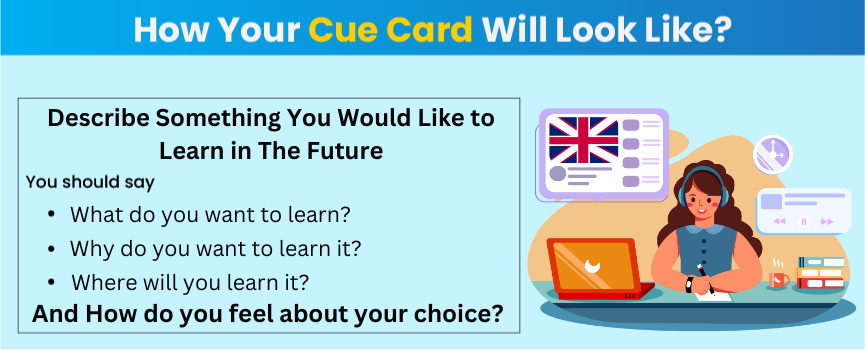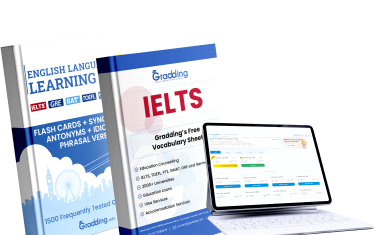Describe Something You Would Like to Learn in The Future - IELTS Cue Card
Last updated: Apr 23, 2025In the 2nd part of the IELTS speaking section, you will be given a cue card where you will have to talk about various day-to-day topics. One of these topics can be “Describe Something You Would Like to Learn in the Future.” However, you will only have one minute to prepare and formulate your answer, which can be an issue for some test takers. We have mentioned three sample answers along with follow-up questions and tips to excel in the IELTS cue card section and answer better on this topic. Read on

Table of Contents
Introduction to IELTS Cue Cards
A cue card in the IELTS speaking part 2 is a small card that will be given to you to assess your ability to speak on a given topic and check your fluency, coherence, vocabulary, and grammar in English. Here, you will get one minute to make notes, prepare, and formulate an answer on the topic, and then talk about it for 1-2 minutes.
The topics on the cue card in IELTS can range from personal experiences to opinions and even reflections on different aspects of everyday life. However, generally, these topics are related to culture, technology, travel, or personal achievements.
One of these topics can be Describe Something You Would Like to Learn in The Future. You can answer this topic effectively by learning the correct way to answer a cue card, which you can find below.
How to Answer the Cue Card?
A great way to answer IELTS cue cards is to utilize the one-minute time provided to brainstorm ideas and structure your response. Additionally, make sure to put extra effort into speaking clearly and in a flow with high vocabulary and correct grammar while answering.
Below are a few more ways that you can follow to answer the cue card effectively:
1. Read Carefully: Make sure that you pay attention to the specific questions or prompts and note down any instructions, like the focus area or the length of the response.
2. Plan Your Response: During the 1 minute of preparation time, try to break down any key points and organize your thoughts into an introduction, body, and conclusion.
3. Stay on Topic: Lastly, while answering, keep on topic and avoid rushing or speaking too quickly.
Additionally, you will also get a few pointers in the cue card that you should add to your answer. This will help you further formulate your answer more precisely and cohesively. To help you, let’s talk about some sample answers for the topic “Describe Something You Would Like to Learn in The Future.” and check out some follow-up questions.
You can use the following pointers in your response:
- What do you want to learn?
- Why do you want to learn it?
- Where will you learn it?
- And how do you feel about your choice?
Below is an image of how your IELTS cue card might look in the IELTS speaking section. Check it out!

Now let’s check out some sample answers for the topic Describe Something You Would Like to Learn in The Future that you can use for your reference.
Describe Something You Would Like to Learn in The Future - Sample 1
Below is a sample answer of something one might would like to learn in the future, that includes all the pointers above. You can take help from this to formulate an answer to get a band score of 8 in IELTS speaking.
Introduction
I enjoy learning new skills every day, but one skill that truly intrigues me is traditional Indian cooking. I believe there is something remarkable about how our elders crafted delicious dishes with simple ingredients and immense skill.
What do you want to learn?
So yes, I would like to master the authentic techniques of Indian cuisine, which includes making fragrant spice blends (masalas). I would also like to learn how to make Indian bread-making processes and even discover traditional methods of pickling and preserving food.
Why do you want to learn it?
I want to learn it because Indian cooking is full of rich traditions and vibrant flavours. I grew up watching my family prepare meals, and this has always fascinated me. Another reason why I want to learn these skills is so that I can embrace my culture and help keep these time-honoured techniques alive.
Where will you learn it?
One way I want to learn is by observing my experienced family members, reading traditional cookbooks, and even taking cooking classes. If I get a chance, I would also like to visit local kitchens and learn firsthand from experts who have been cooking in this way for generations.
And How do you feel about your choice?
I feel enthusiastic and motivated about my choice, as for me, cooking is more than just making meals. It is a way to connect with history, share experiences, and appreciate the beauty of my traditions.
Conclusion
So, for me, learning Indian cooking is not just about following recipes; it will help me preserve the legacy and celebrate the culinary heritage of my culture. I’m excited to refine my skills and create dishes that reflect the essence of Indian cuisine.

 Access speaking Mock Test
Access speaking Mock Test Describe Something You Would Like to Learn in The Future - Sample 2
In this next sample, you will find a rich vocabulary for IELTS to help boost your lexical resource score.
Introduction
Through my experience, I have found that learning a new skill is always rewarding, and I would love to expand my knowledge. One thing I have always wanted to explore and learn is a new language, and Italian has always been at the top of my list for a long time.
What do you want to learn?
I would like to learn the basics of Italian because it is a graceful and melodic language with a rich history. Additionally, learning Italian will help me enjoy books in their original form and appreciate classic Italian films better.
Why do you want to learn it?
I admire authors like Jhumpa Lahiri, who dedicated years to learning Italian and eventually started writing in it. If I learn Italian, I will be able to read literary works by renowned writers like Elena Ferrante and Italo Calvino without relying on translations. In addition to that, it would also allow me to understand the cinematic masterpieces of directors like Fellini and De Sica.
Where will you learn it?
To become proficient, I plan to enrol in a credible language institute that offers recognized certification. I will also learn through immersive methods like listening to Italian music, watching films, and reading simple articles. Since I already know some French, which shares Latin roots with Italian, I believe this prior knowledge will help me learn the language more efficiently.
How do you feel about your choice?
I feel excited and motivated to start learning a new language, as it is not just about communication; it is more about it being a gateway to understanding new cultures, perspectives, and ways of thinking. Italian, in particular, has a charming and expressive quality that makes learning even more fascinating.
Conclusion
So yes, I would love to learn Italian, and it will open up valuable opportunities for me, both academically and professionally. It will also enrich my cultural experiences and allow me to appreciate the beauty of this language in literature, cinema, and daily conversations.


Describe Something You Would Like to Learn in The Future - Sample 3
You can take a reference from our 3rd sample if you want a precise and quick answer that won’t compromise your overall band score in the IELTS speaking section. Check it out!
Introduction
Ever since I was a kid, I have been interested in traditional Indian crafts because they are beautiful and full of history. One major reason behind this obsession is the skill and creativity of Indian artisans, and I would love to learn more about them.
What do you want to learn?
So, I would like to learn and explore various traditional Indian crafts like the art of block printing, pottery-making, and jewellery craftsmanship. As these crafts require patience, precision, and artistic talent, learning them will allow me to appreciate how much work goes into making traditional handmade items.
Why do you want to learn it?
One major reason why I want to learn this is that Indian crafts are an important part of our culture and have been passed down for generations. Learning them will help me understand the techniques that make them unique and keep these traditions alive. In addition to that, it will also be exciting to create something with my own hands.
Where will you learn it?
To learn this, I plan to join a trusted craft workshop and learn from skilled artisans. I will also study books, watch tutorials, and visit exhibitions to immerse myself in the history and techniques of these crafts.
How do you feel about your choice?
I feel enthusiastic and motivated to start this journey. As for me, learning crafts is not just about making things, it is more about connecting with culture, developing new skills, and experiencing the joy of creativity.
Conclusion
So yes, for me, traditional Indian crafts are a treasure that should be preserved and celebrated. I am excited to learn, practice, and hopefully create beautiful pieces that show the rich heritage of Indian craftsmanship.

Lexical Resources
In the IELTS speaking part 2, your response will also be scored based on lexical resources, which refers to how advanced your vocabulary is and how effectively you use it in communication. So, it is really important to use advanced words to impress your examiner and showcase your English language speaking skills.
In the table below, we have listed all the advanced words used in our samples above. These words will help you score better in lexical resources:
| Lexical Resources | Meaning |
|---|---|
| Intrigues | Makes you curious or interested |
| Remarkable | Amazing or worth noticing |
| Immense | Very large or great |
| Fragrant | Having a pleasant smell |
| Fascinated | Deeply interested or amazed |
| Embrace | Accept or welcome something |
| Firsthand | Experienced directly, not through someone else |
| Enthusiastic | Excited and eager |
| Culinary heritage | Traditional cooking practices and food culture |
| Graceful | Elegant and smooth |
| Melodic | Pleasant and musical sound |
| Proficient | Skilled or good at something |
| Credible | Trustworthy or believable |
| Immersive | Deeply involved or engaging |
| Gateway | An entry point or means to access something |
| Patience | Ability to wait calmly without frustration |
| Precision | Accuracy and carefulness |
| Motivated | Having a strong reason to do something |
| Experiencing | Going through or feeling something |
| Heritage | Traditions, history, or culture passed down |
| Craftsmanship | Skill and expertise in making things |
| Artisans | Skilled craft workers who create handmade goods |
| Rewarding | Providing satisfaction or a sense of achievement |
| Cinematic | Related to movies or visually dramatic storytelling |
| Literary | Connected to written works, especially books or poetry |
| Preserved | Kept intact or protected from damage or decay |
| Perspectives | Different ways of viewing or understanding something |
Follow-up Questions
Once you are done answering the cue card in the IELTS speaking section, the examiner will ask you some follow-up questions about your response. This part will generally last around 4-5 minutes, so make sure that you take up a few extra IELTS speaking mock test to be able to answer these follow-up questions smoothly.
Below are some follow-up questions you can get in the topic Describe Something You Would Like to Learn in The Future, to help you better understand this section.
1. Why do you think learning new skills is important?
I believe learning a new skill can help us grow, adapt, and even improve our overall knowledge. It even opens up many career opportunities, boosts confidence, and keeps our minds engaged.
2. Do you prefer learning on your own or taking formal classes?
My choice of learning method depends on what I want to learn. Both methods have advantages. While learning independently can allow flexibility, taking formal classes can provide structured guidance and access to expert teachers. So, depending on the skill, I would choose the best approach.
3. How do you think technology has changed the way people learn today?
There is no doubt that technology has made learning more accessible and interactive. There are so many resources and options available, like online courses, educational apps, and virtual tutorials, that help people in learning at their own pace. In recent times, AI and digital tools have also provided personalized learning experiences that make education more efficient.
4. Have you ever learned something new that completely changed your perspective?
Yes, I learned a new language, which changed how I viewed cultures and communication. It made me realize how expressions, traditions, and ways of thinking differ around the world. For me, learning something new always opens doors to fresh insights.
5. If you had unlimited time and resources, what would you love to learn?
If I had unlimited time and resources, I would love to master multiple languages, learn musical instruments, and explore traditional crafts. Having the freedom to immerse myself in different subjects would be an incredible experience!
Tips to Excel in IELTS Cue Card
To excel in the IELTS speaking part 2, you can follow a strategic plan to articulate your answer better. To help you, below are some tips:
1. Start by reading the cue card and jotting down the key points to understand what you are expected to address.
2. You should also avoid memorizing answers and try to speak more naturally to demonstrate coherence in your answers.
3. Another great tip to ace cue cards is to use high vocabulary, good grammar, and effective phrases to score better in lexical resources. However, make sure that you avoid overusing complicated words, as they can break your flow and don’t sound natural.
Last but the most important one is to practice as much as you can. Make sure that you solve a good number of IELTS speaking mock test and record yourself to identify areas for improvement.
Suggested Read:
1. Describe A Book That You Read Many Times IELTS Cue Card.
2. Describe An Actor Or Actress Whom You Admire Cue Card
3. Describe The Place Where You Live Ielts Cue Card
4. Describe An Invention That Is Useful In Daily Life Ielts Cue Card
5. Describe A Successful Businessperson You Know Ielts Cue Card
6. Describe A Cafe You Like To Visit Ielts Cue Card
7. Describe A Time When You Received Money As A Gift
Conclusion
In conclusion, the IELTS speaking part 2 can be a little tough for some test takers, but with enough practice and the right tools, anyone can master it. In our blog above, we gave you a few sample answers on Describe Something You Would Like to Learn in the Future, along with a few follow-up questions and tips.
However, if you are struggling with your IELTS preparation, you can join our online IELTS classes. Our Gradding experts will provide extensive study material and guidance to help you get your dream IELTS score.
0 comments

Practice Makes a Man Perfect!Take FREE ielts Mock Tests
Start FREE Mock TestPredict your IELTS Band

98% students got exact IELTS Band
What is your Target IELTS Band?
Get familiar with the Real IELTS Exam for Free!
Start Free Mock TestWe are available in :
BangaloreAhmedabadJaipurHyderabadKeralaPuneChandigarhMumbaiGurgaonChennaiKolkataTrivandrumNoidaKochiCalicutKottayamKollamThrissurIndoreUdaipurdisclaimer:logos and other registered trademarks of universities used on this platform are held by their respective owners. Gradding does not claim ownership or association on them, and their use is purely for informational and illustrative purposes.















